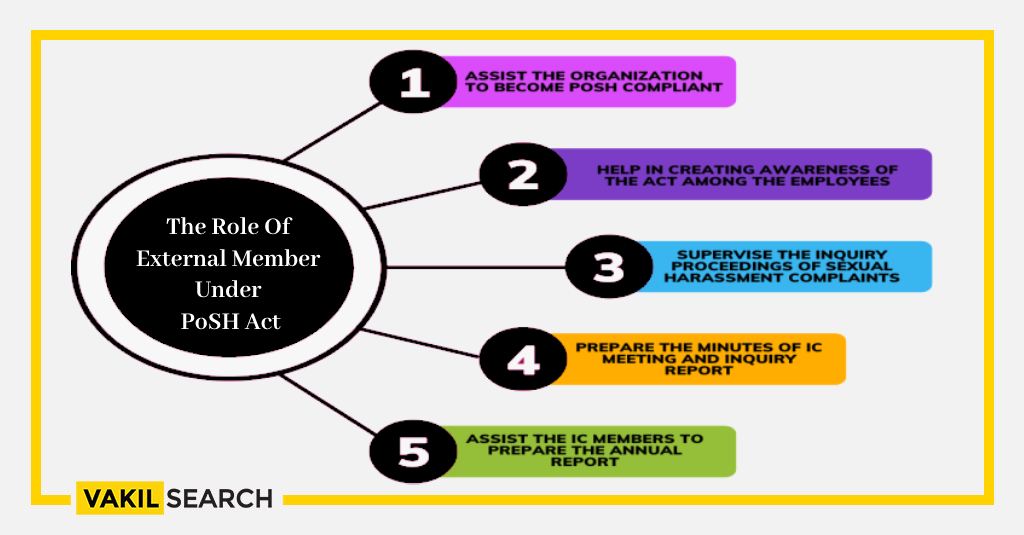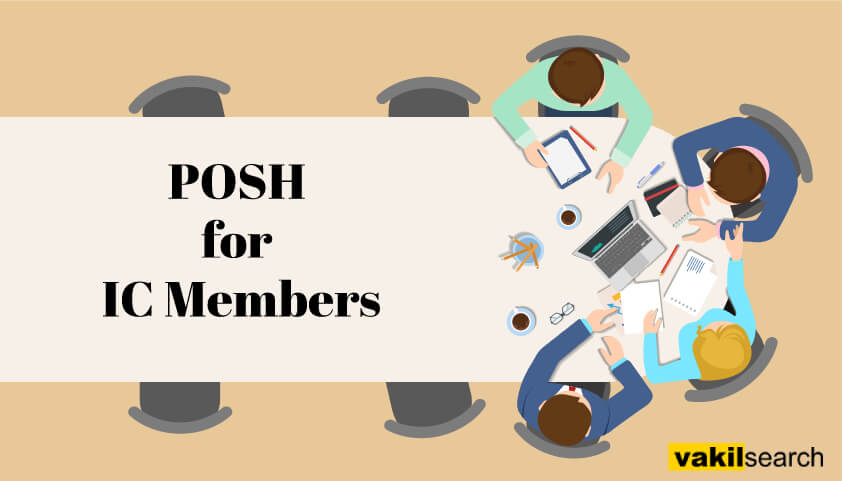As an IC member, it is important to understand the provisions of the Prevention of Sexual Harassment (POSH) Act to ensure a safe work environment for all.
All Internal Committees (IC) members need to understand the complexities of the Prevention of Sexual Harassment (POSH) laws in India. This guide is designed to provide important information about the compliance regulations for POSH and the implementation of a POSH policy at the workplace. We will also discuss the importance of supporting employees and ensuring POSH compliance. With this guide, IC members can equip themselves with the right knowledge to ensure a safe and secure environment for employees within the organisation.

Overview of POSH for IC Members
The Protection of Women from Sexual Harassment at Workplace (POSH) Act is a law implemented by the Indian Government in 2013 to ensure a safe and secure work environment for all women. The Act provides a mechanism for the prevention, prohibition, and redressal of any form of sexual harassment experienced by women in the workplace.
Under the Act, the Internal Complaints Committee (ICC) is formed, comprising members elected by the organisation. The ICC is responsible for looking into all the complaints of sexual harassment and providing necessary support to the victim. The members of the ICC are supposed to be gender-balanced. They have the knowledge and expertise needed to address the complaints. The ICC plays a vital role in ensuring that women are protected from all forms of sexual harassment in the workplace.
What is POSH and its Implications for IC Members
POSH, or the Prevention of Sexual Harassment Act, is a groundbreaking act of law in India that was put in place in 2013. It serves to protect employees from sexual harassment in the workplace and to provide a mechanism to address and redress any grievances on the matter.
As an IC member, familiarising yourself with the POSH guide and its implications is important. This guide outlines the internal processes, procedures, and systems that need to be put in place to ensure that all employees are protected from sexual harassment and that any incidents are dealt with in a timely and appropriate manner. It is your responsibility to ensure that these processes are implemented and that everyone in the organisation is aware of their rights and responsibilities should any incident arise.
The POSH guide is valuable for IC members and must be taken seriously. Its implications for members are that they must be diligent in preventing, detecting, and correcting any cases of sexual harassment in the workplace. They are responsible for ensuring that all employees are safe and protected and that any grievances are handled with sensitivity and fairness.
Understanding the Compliance Regulations for POSH
The POSH (Prevention of Sexual Harassment) compliance regulations are essential for any organisation today. It is important to clearly understand these regulations to maintain a safe and harassment-free workplace.
The regulations provide guidance on the duties and responsibilities of organisations as well as IC members (Internal Committees) on handling sexual harassment and other related issues. The POSH compliance policy outlines the procedures and protocols that should be followed to ensure that the organization is compliant with the law.
It also outlines the roles and responsibilities of IC members, including their role in conducting inquiries, investigating complaints, and taking appropriate disciplinary action. Knowing and understanding the compliance regulations for POSH is essential to create a workplace free from harassment and discrimination.
Implementing a POSH Policy at the Workplace
Implementing a POSH (Prevention of Sexual Harassment) policy at the workplace is essential for creating a safe, respectful and professional working environment. POSH policies provide guidance on how to identify and address sexual harassment and provide resources to employees to ensure they feel comfortable speaking up and addressing any issues they may experience. It is important to ensure that all IC (Internal Committee) members are properly trained on the company’s POSH policy to understand their roles and responsibilities.
The IC should also be familiar with the legal implications of sexual harassment and be able to provide support to employees who may be victims of harassment. It is also important to ensure that the POSH policy is regularly updated to keep up with any changes in the law or the workplace. By implementing a POSH policy and taking the necessary steps to ensure it is followed, employers can help create a safe, respectful and professional work environment for all.
Supporting Employees and Ensuring Compliance

The organisation must ensure that it complies with the relevant laws pertaining to protecting its employees from any form of harassment, discrimination, and victimisation. The POSH Guide provides detailed guidance on preventing sexual harassment at the workplace and the responsibilities of the Internal Complaints Committee (IC) members.
Organisations must ensure that their employees understand their rights and the legal provisions for their protection and that the IC members are adequately trained to handle complaints professionally. Organisations must also ensure that all employees know the POSH Guide, the process of filing a complaint, and the avenues available for redressal. By doing so, organisations can create a safe and secure working environment and ensure compliance with the legal framework.
Steps for Implementing a POSH Program in IC
- Implementing an effective POSH program in an organisation is important in creating a safe work environment.
- The POSH program should be implemented based on the guidelines provided by Indian law and should be tailored to meet the organisation’s specific needs.
- As a first step, the organisation should form an Internal Complaints Committee (ICC) comprising members from different departments.
- The ICC will be responsible for addressing any grievances related to sexual harassment in the workplace. This committee must be formed with members with the necessary skills, knowledge and training to handle such grievances.
- Once the committee is formed, they should be given a proper induction to understand their roles and responsibilities.
- The organisation should also create a POSH policy document that sets out the guidelines and procedures for addressing any grievances related to sexual harassment in the workplace.
- The policy document should be made available to all the organisation’s employees.
- Finally, the organisation should set up mandatory training sessions for all employees to educate them on the POSH policy and to create awareness about sexual harassment in the workplace.
- By following these steps, the organisation can effectively implement a POSH program and create a safe and secure work environment for their employees.
Resources to Support IC Members on POSH
- As an IC Member, it is important to stay up-to-date with the latest regulations and procedures relating to POSH.
- To ensure that IC Members are properly informed, a range of resources are available to help them understand and abide by the rules.
- These include reading material, webinars, and workshops designed to provide IC Members with the knowledge they need to remain compliant.
- IC Members can also access online tools such as the POSH Guide, which is a comprehensive guide to understanding and implementing the POSH Act.
- With these resources, IC Members can ensure that they are properly informed and supported in their work.
Conclusion
The ultimate POSH guide for IC members is a comprehensive tool to help employers and employees understand the regulations and implications of having a POSH policy. By understanding the compliance regulations, implementing the policy, and supporting employees, businesses can protect their workers and ensure compliance with the law.
Through this guide, IC members can be equipped with the knowledge and resources they need to manage a POSH policy successfully. Whether you are a large company or a small business, new to an industry, or a sole proprietor, Vakilsearch offers the most trusted and tailored solutions for your legal needs.




